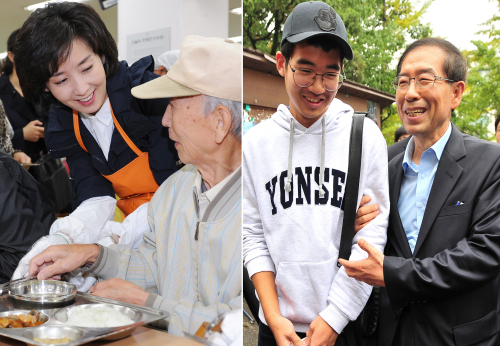Park ahead of Na in cyber campaign; Twitter users criticize online crackdown
With the Seoul mayoral by-election looming next Wednesday, the online campaigns are heating up, with independent candidate Park Won-soon taking a visible lead over Na Kyung-won of the ruling Grand National Party.
The SNS battle between the two top candidates also brought up a debate on the leverage and legitimate boundaries of SNS election campaigning.
In cyberspace, civic activist Park currently has 145,000 followers ahead of not only all the mayoral hopefuls, but even former GNP chairwoman Park Geun-hye, frontrunner in next year’s presidential race.
A number of progressive public figures, including professor Cho Kuk of Seoul National University Law School, have taken part in Park’s campaign to spread the word on Twitter.
Na, on the other hand, has stepped up her online campaign to make up for the right wing’s weakness in social networking.
“We have asked party members to communicate more actively through SNS, placing focus on younger, first-term lawmakers,” said the online spokesperson for Na’s camp.
Efforts are also being made to find an influential conservative debater who may counteract Park’s Twitter group, he said.
 |
Na Kyung-won (left photo) and Park Won-soon (right photo) meet voters. (Yonhap News) |
Despite such efforts, however, Na’s Twitter account is not as lively as Park’s, especially since the recent suggestions that she hired a part-time worker to put up positive remarks.
The National Police Agency pledged on Thursday to respond firmly to all illicit campaigns detected on Twitter, Facebook and other forms of SNS, officials said Thursday.
The prosecution made a similar announcement Wednesday, following a local district court ruling which convicted a citizen of illicit campaigning through Twitter.
The Uijeongbu District Court handed down a fine of 1 million won to a 41-year-old office worker for campaigning against specific lawmakers in regard to next year’s general election.
“Twitter may be seen as one of the telecommunications methods as defined by the public election law,” said the court in its ruling.
“It is also more powerful than other online communities and blogs in conveying one’s opinion to many unspecified people.”
The actions came amid concerns that such networking services may be abused with the intention to tarnish the image of a certain candidate.
According to the prosecutorial guidelines and Seoul City’s election commission, users may support a specific candidate by posting his or her campaign pledges on SNS but may not spread rumors based on speculations or make personal attacks.
Also, they may post pictures of themselves near voting stations, as to prove their participation in the vote, but may not show which candidate they cast their ballot for, said officials.
Twitter users, however, lashed out at the authorities’ response, claiming that the crackdown was based on arbitrary standards and that the online space should be left as a forum for free communication.
Several users also shared a set of tips on evading the prosecutors’ investigation.
The National Election Commission, from 2009 up to last week, has detected 45 cases of public election law violations through SNS, according to officials.
It also charged a Twitter user with mimicking Na’s account and posting derogatory messages about her.
By Bae Hyun-jung (
tellme@heraldcorp.com)








